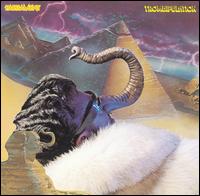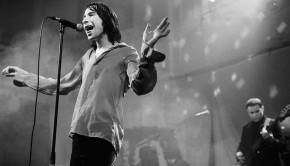Panned Gold: Parliament – Trombipulation
In Panned Gold, Dave looks at albums that got a bad rap. Today we look at George Clinton / Parliament’s misunderstood at the time Trombipulation.
Panned Gold is our way of reminding music fans of the wealth we miss out on when we adhere to a critic or algorithm’s notion of ‘the best.’ Albums that deserve to be heard, but for many reasons, have become known as missteps or duds.
Parliament – Trombipulation
The common knowledge suggests that by the eighties, when Parliament made Trombipulation and Gloryhollastoopid, the band had lost its chemistry, some vital members, and relevance in the funk genre they had ruled and schooled for years. George Clinton was at the end of a decade that would have killed many weaker men, and his voice was so burned out from coating his throat with cocaine that he sounded like he was speaking through a rock tumbler. His solo reemergence was years away. He was still clinging to the Parliament moniker that would soon go stagnant for nearly three decades. Trombipulation must have seemed a little desperate in 1980. It wasn’t disco, it certainly wasn’t rock, it wasn’t tapped into the rising tide of rap, and its sound was too freaky to chart a hit, but listening to it now, one can hear plenty of the earliest synth-funk sounds that would eventually become earmarks of eighties pop.
One of the reasons this record gets a bad rap is because of the amount of time Clinton spends in the loquaciousness of his alter ego Sir Nose. The first two tracks on Trombipulation definitely have potential for a room-clearing effect due to this issue, and could easily set the listener up for a ‘this record is crap’ assessment early on.
The cover art is an odd and off-putting display as well, mostly featuring snaps of Clinton wearing a prosthetic elephant trunk overtop of his nose, sometimes tilting it towards a red, plastic spoon. He had been playing for some time with different versions of fake noses to help characterize Sir Nose beyond the squeaking voice heard on record. The featured version he finally settled on was crafted by a dildo artisan. Suffice it to say that George was pretty gone by this point, hardly seeming like he’d still be around making music nearly thirty years later. He has said of this era that it was the time when he switched from acid to crack, as bluntly as some musicians might speak of changing their guitar strings.
Trombipulation, despite the sad and dangerous circumstances under which it was made, is one of the earliest examples of the synthesizer being used in a playful, silly fashion, much like it is in the work of Roger Troutman and his Clinton-produced family band, Zapp. Pre-1980s, synths just weren’t used this way. Most artists in the 70s, whether they were staid and serious (Kraftwerk) or sophisto-cool (Moroder) used synths much like orchestral music often uses strings – as a calm, atmospheric layer for the other instruments to be played over. Without his reliable stable of Parliament guitarists to accent the groove, the natural move was to play the hooks and basslines on the electronic keys, and to make use of wonky, quacking synth effects the way Eddie Hazel used a pedal or a whammy. Clinton and Troutman were putting their melodic, barbershop, doo-wop melodies into a jaunty electro framework without any template outside of their own instincts to guide their alchemy. When this cocktail curdles, it curdles hard, sounding ridiculous – even embarrassing. When it works though, like it does on most of the tracks that come after Trombipulation‘s first two numbers, it lays a path for synth-funk to study and follow. It also informs whitebread pop about how to spice up a simple radio-friendly cut with a keyboarded razzle.
Listen to any playlist of hits from 1983 to 1985 and you’ll hear funky little synth hooks that give already catchy songs a little extra something to make them stick in your brain. Everyone did it, from Prince to The Cars to Cyndi Lauper. Trombipulation abounds with these hooks, birthing so many of them that several seem like throwaways, used a few times in a track and never returned to. Parliament weren’t milking these trills to meticulously accent simple pop songs, they were just throwing them in there and moving on.
The effect is messy – no question. This is not the clean, funky electrified pop that would later hit ears on hits by Michael Jackson, Van Halen, or Madonna. This is more like the work of a true innovator still in the process of figuring out how the keyboard might be utilized to jump-start a tuneful ditty and make it lock into your mind. By the time he made his solo record Computer Games, featuring the electro-funk essential Atomic Dog, George would have it figured out and perfected. Trombipulation is a key part of the journey from the vocal harmonies of The Parliaments (an early incarnation of Clinton’s group) to the infectious, electric groove of Atomic Dog. Computer Games is George having figured out how to loop and hook a line into a repetitive break that could then be disrupted for effect. Trombipulation is George before he learned to loop a breakbeat, so we can hear him letting the tracks ramble and jam into insane and exciting places, more like he did when he still had the previous Parliament lineups on the live stage.
This oft-forgotten record also has a smattering of the more traditional slap-bass/horn section/wah-wah guitar construction. ‘Peek-a-Groove’ is a totally serviceable Parliament band–jam. ‘New Doo Review’ is a loose, silly freak out that does the legacy proud with call-and-response and a pronounced cymbal crash forever accentuating “the one.”
The real gem of the record, nestled surreptitiously in the midst of the second side, is ‘Let’s Play House.’ Right from the opening break – which Shock G and crew would later sample into Digital Underground’s classic ‘The Humpty Dance’ – George’s post-seventies funk resilience is assuredly and authoritatively announced. This is not a quintessential P-Funk number like ‘Flashlight’ or ‘Up for the Down Stroke’. It’s an innovative and revolutionary P-funk number, one that’s better suited to a tightly produced studio setting than an unhinged, live breakdown. It’s a beacon of funk-to-come, shining a light to a time when every west coast hip hop DJ would be chopping George’s catalogue into breakbeat stardom. ‘Let’s Play House’ doesn’t outwardly consider what kind of fun might be had in a Burger King bathroom, but it provides a fitting soundtrack for those who do. Trombipulation doesn’t sound like it has mastered the ways of keyboard funk, but it does sound like someone having a hell of a good time figuring it out.
















